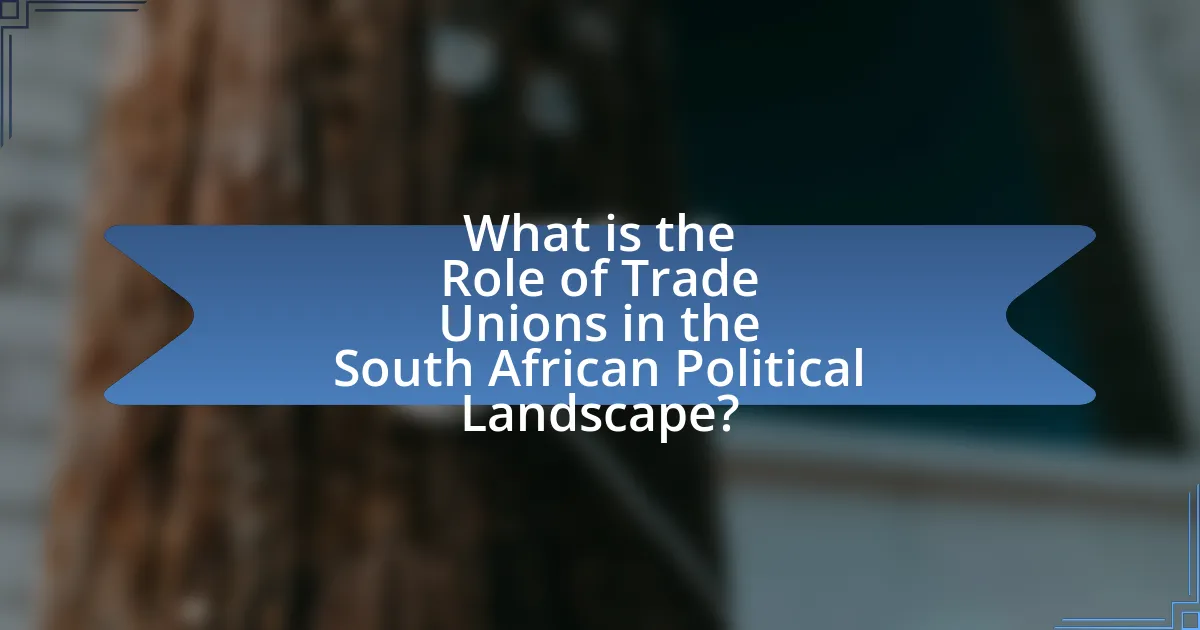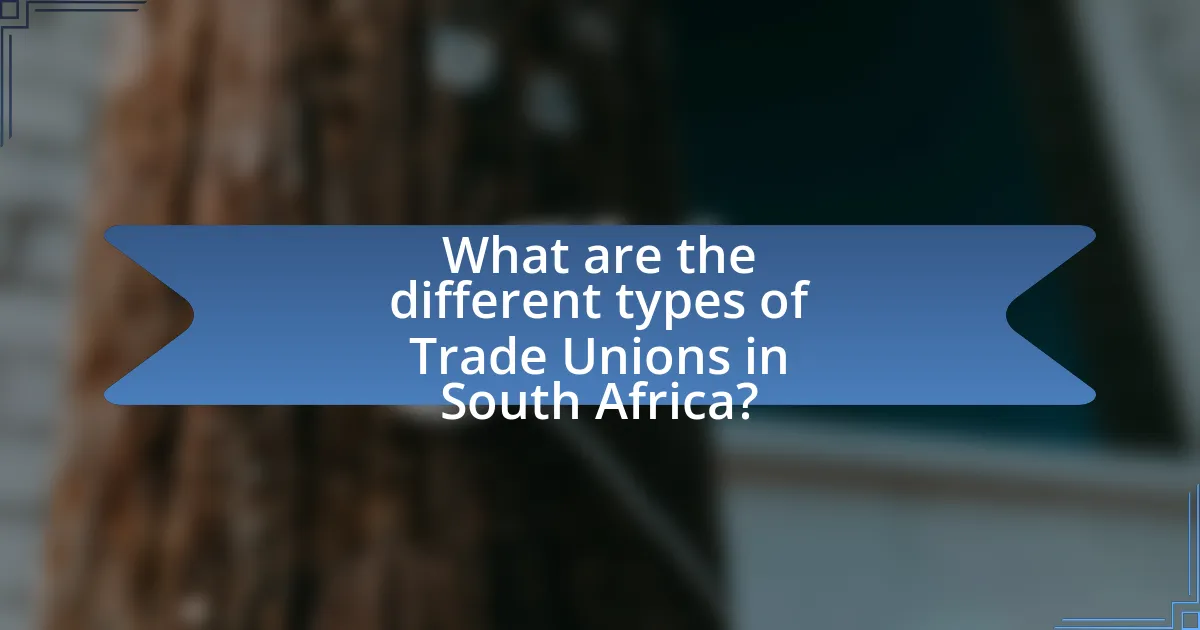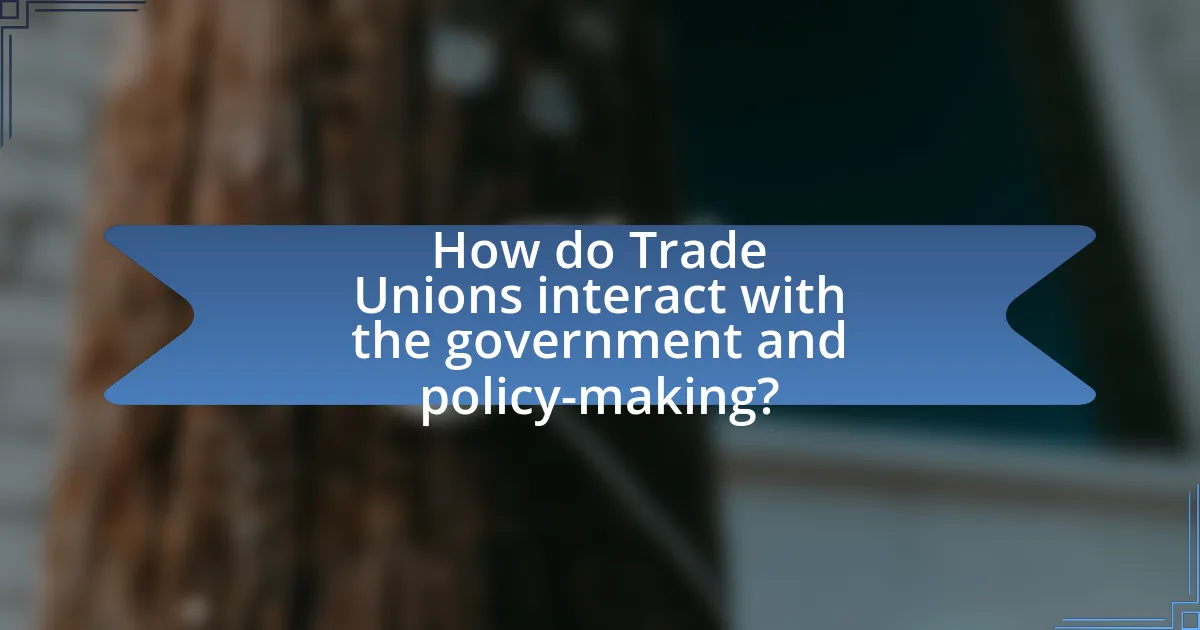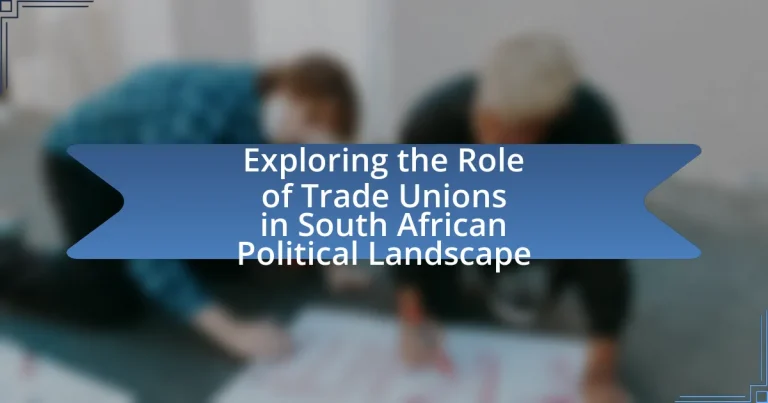Trade unions are pivotal in the South African political landscape, primarily advocating for workers’ rights and influencing policy decisions. They engage in collective bargaining, political lobbying, and mobilization, significantly impacting labor laws and social justice initiatives. Historically, unions like the Congress of South African Trade Unions (COSATU) have played a crucial role in the anti-apartheid movement and continue to shape governance through their affiliations with political parties, particularly the African National Congress (ANC). The article explores the mechanisms through which trade unions exert political influence, their historical significance, current challenges, and their contributions to social justice and legislative processes in South Africa.

What is the Role of Trade Unions in the South African Political Landscape?
Trade unions play a crucial role in the South African political landscape by advocating for workers’ rights and influencing policy decisions. They serve as a collective voice for labor, engaging in negotiations with employers and the government to secure better wages, working conditions, and job security. Historically, trade unions in South Africa, particularly the Congress of South African Trade Unions (COSATU), have been instrumental in the anti-apartheid movement, contributing to the establishment of a democratic government in 1994. Their political influence is evident as they often align with political parties, notably the African National Congress (ANC), shaping labor policies and social justice initiatives. This relationship underscores the unions’ significance in promoting economic equity and social change within the country.
How do Trade Unions influence political decisions in South Africa?
Trade unions in South Africa significantly influence political decisions through their ability to mobilize large groups of workers and advocate for labor rights. They engage in collective bargaining, which directly impacts legislation related to labor laws, wages, and working conditions. For instance, the Congress of South African Trade Unions (COSATU) has historically played a crucial role in shaping policies by aligning with political parties, particularly the African National Congress (ANC), thereby affecting governance and policy-making processes. Additionally, trade unions organize strikes and protests, which can pressure the government to address workers’ demands, as seen during the 2012 Marikana miners’ strike that highlighted labor issues and led to national discussions on wage disparities and worker rights.
What mechanisms do Trade Unions use to exert political influence?
Trade unions exert political influence primarily through collective bargaining, political lobbying, and mobilization of their membership. Collective bargaining allows unions to negotiate labor contracts that can shape labor laws and policies, impacting political decisions. Political lobbying involves unions advocating for specific legislation or policies that benefit workers, often engaging with lawmakers to promote their interests. Additionally, unions mobilize their members to participate in political campaigns, voter registration drives, and protests, amplifying their voice in the political arena. For instance, the Congress of South African Trade Unions (COSATU) has historically played a significant role in influencing government policy through these mechanisms, demonstrating their effectiveness in shaping the political landscape in South Africa.
How do Trade Unions engage with political parties?
Trade unions engage with political parties primarily through formal affiliations, lobbying, and influencing policy agendas. In South Africa, trade unions like the Congress of South African Trade Unions (COSATU) have historically aligned with the African National Congress (ANC), providing electoral support and mobilizing members to vote. This relationship allows unions to advocate for labor rights and social justice within the political framework. Additionally, unions participate in policy discussions, contributing to legislation that affects workers’ rights, such as the Labour Relations Act. Their engagement is evidenced by the significant role unions played in the anti-apartheid movement, which shaped the current political landscape.
Why are Trade Unions significant in South Africa’s history?
Trade unions are significant in South Africa’s history because they played a crucial role in the anti-apartheid movement and the fight for workers’ rights. During the apartheid era, trade unions organized strikes and protests that challenged the oppressive regime, mobilizing workers across various sectors. For instance, the formation of the Congress of South African Trade Unions (COSATU) in 1982 united multiple unions and became a powerful force advocating for social justice and political change. This collective action contributed to the eventual dismantling of apartheid and the establishment of a democratic government in 1994, highlighting the unions’ impact on both labor rights and broader societal transformation.
What historical events shaped the role of Trade Unions in South Africa?
The role of Trade Unions in South Africa was significantly shaped by historical events such as the 1922 Rand Rebellion, the establishment of the African National Congress (ANC) in 1912, and the anti-apartheid struggle. The 1922 Rand Rebellion highlighted the need for organized labor in response to economic exploitation, leading to the formation of the South African Trade Union Congress. The ANC’s formation provided a political platform that aligned labor rights with the broader struggle for racial equality. Additionally, the 1980s saw a surge in union activity as trade unions became central to the anti-apartheid movement, exemplified by the formation of the Congress of South African Trade Unions (COSATU) in 1982, which united various unions to challenge the apartheid regime. These events collectively established trade unions as vital players in South Africa’s political landscape, advocating for workers’ rights and social justice.
How did apartheid impact the formation and function of Trade Unions?
Apartheid significantly restricted the formation and function of trade unions in South Africa by enforcing racial segregation and limiting workers’ rights. Under apartheid laws, black workers faced severe limitations in organizing and participating in unions, as the government aimed to suppress any collective action that could challenge the status quo. For instance, the Industrial Conciliation Act of 1956 excluded black workers from registered trade unions, which hindered their ability to negotiate for better wages and working conditions. This systemic oppression led to the emergence of independent trade unions, such as the Congress of South African Trade Unions (COSATU) in 1982, which sought to unite workers across racial lines and advocate for broader social and political rights. The struggle for union recognition became intertwined with the anti-apartheid movement, demonstrating how apartheid’s impact on trade unions was both a catalyst for resistance and a reflection of the broader fight for equality in South Africa.
What challenges do Trade Unions face in the current political climate?
Trade unions in South Africa face significant challenges in the current political climate, primarily due to government policies that often prioritize economic growth over labor rights. The weakening of labor laws and the rise of precarious employment have undermined union power, making it difficult for unions to effectively advocate for workers’ rights. Additionally, political fragmentation and the influence of populist movements have led to a decline in union membership and solidarity. For instance, the South African Federation of Trade Unions reported a decrease in membership from 2.2 million in 2012 to approximately 1.8 million in 2021, highlighting the impact of these challenges on union strength and influence.
How do economic factors affect Trade Union activities?
Economic factors significantly influence Trade Union activities by shaping their priorities, strategies, and overall effectiveness. For instance, during periods of economic downturn, unions often focus on job security and wage preservation, as seen in South Africa’s labor movements during the 2008 financial crisis, where unions advocated for worker protections amid rising unemployment rates. Additionally, economic growth can lead unions to push for better wages and working conditions, reflecting the increased bargaining power that comes with a tighter labor market. The South African Congress of Trade Unions reported that in times of economic expansion, union membership and activism tend to rise, as workers feel more secure in their positions and are more willing to engage in collective bargaining. Thus, the economic climate directly impacts the focus and intensity of Trade Union activities.
What internal challenges do Trade Unions encounter?
Trade unions encounter several internal challenges, including leadership conflicts, member engagement issues, and financial sustainability concerns. Leadership conflicts often arise from differing ideologies and priorities among union leaders, which can hinder decision-making and weaken the union’s effectiveness. Member engagement issues stem from a lack of communication and involvement, leading to apathy among members and reduced participation in union activities. Financial sustainability concerns are exacerbated by fluctuating membership numbers and reliance on dues, making it difficult for unions to maintain operations and fund initiatives. These challenges can significantly impact the overall strength and influence of trade unions within the South African political landscape.
How do Trade Unions contribute to social justice in South Africa?
Trade unions contribute to social justice in South Africa by advocating for workers’ rights, promoting equitable labor practices, and influencing policy reforms. They engage in collective bargaining to secure fair wages and better working conditions, which directly impacts the economic well-being of their members. For instance, the Congress of South African Trade Unions (COSATU) has played a pivotal role in shaping labor laws that protect workers from exploitation and discrimination. Additionally, trade unions mobilize communities to address broader social issues, such as inequality and access to basic services, thereby fostering a more just society. Their efforts have been instrumental in advancing legislation that supports social justice, such as the Basic Conditions of Employment Act and the Labour Relations Act, which aim to create a fairer labor market in South Africa.
What initiatives do Trade Unions undertake to promote workers’ rights?
Trade unions undertake various initiatives to promote workers’ rights, including collective bargaining, advocacy for labor laws, and organizing strikes. Collective bargaining allows unions to negotiate better wages, benefits, and working conditions on behalf of their members, which is a fundamental right recognized in international labor standards. Additionally, trade unions actively lobby for the enactment and enforcement of labor laws that protect workers from exploitation and discrimination, such as the Basic Conditions of Employment Act in South Africa. Organizing strikes serves as a powerful tool for unions to demonstrate solidarity and pressure employers to address grievances, thereby reinforcing workers’ rights. These initiatives are essential in ensuring that workers have a voice and are treated fairly in the workplace.
How do Trade Unions address issues of inequality and discrimination?
Trade unions address issues of inequality and discrimination by advocating for equitable labor practices and promoting policies that protect marginalized workers. They engage in collective bargaining to secure fair wages, benefits, and working conditions, which directly combat economic disparities. For instance, in South Africa, trade unions like the Congress of South African Trade Unions (COSATU) have historically fought against apartheid-era labor laws that perpetuated racial discrimination, leading to significant legislative changes that promote equality in the workplace. Additionally, trade unions provide support and resources for workers facing discrimination, ensuring that grievances are addressed through legal channels and workplace policies. This multifaceted approach not only empowers individual workers but also fosters a more inclusive labor market.

What are the different types of Trade Unions in South Africa?
The different types of trade unions in South Africa include craft unions, industrial unions, general unions, and federations. Craft unions represent workers in specific trades or crafts, such as electricians or plumbers, focusing on skilled labor. Industrial unions encompass all workers within a particular industry, regardless of their specific job roles, promoting broader industry interests. General unions represent a diverse range of workers across various sectors, allowing for a more inclusive membership. Federations, such as the Congress of South African Trade Unions (COSATU), are umbrella organizations that unite multiple trade unions to strengthen collective bargaining power and political influence. These classifications reflect the diverse landscape of labor representation in South Africa, which is shaped by historical, economic, and social factors.
How do these types of Trade Unions differ in their objectives?
Trade unions in South Africa differ in their objectives primarily based on their ideological foundations and the sectors they represent. For instance, industrial unions focus on specific industries and aim to improve wages and working conditions for their members, while general unions advocate for broader social and economic issues affecting all workers, regardless of industry. Additionally, political unions may prioritize influencing government policy and legislation to benefit the working class, reflecting a more activist approach. This differentiation is evident in the South African context, where unions like COSATU (Congress of South African Trade Unions) engage in political advocacy, while others may concentrate solely on collective bargaining within specific sectors.
What are the characteristics of industrial Trade Unions?
Industrial trade unions are characterized by their focus on representing workers within specific industries, advocating for their rights, and negotiating collective bargaining agreements. These unions typically have a structured organization, including elected leadership and membership dues, which support their operational activities. Additionally, industrial trade unions engage in political advocacy to influence labor laws and policies that affect their members, reflecting their role in the broader socio-political landscape. For instance, in South Africa, industrial trade unions have played a significant role in the anti-apartheid movement, demonstrating their capacity to mobilize workers for social change.
How do craft Trade Unions operate within the political landscape?
Craft Trade Unions operate within the political landscape by advocating for the interests of skilled workers and influencing policy decisions that affect their members. These unions engage in collective bargaining, lobbying government officials, and participating in political campaigns to promote labor-friendly legislation. For instance, in South Africa, craft unions like the National Union of Metalworkers of South Africa (NUMSA) have historically played a significant role in shaping labor laws and policies, contributing to the establishment of minimum wage standards and improved working conditions. Their political activities are often aimed at ensuring that the voices of skilled workers are represented in legislative processes, thereby impacting broader socio-economic policies.
What role do federations of Trade Unions play in South Africa?
Federations of Trade Unions in South Africa play a crucial role in advocating for workers’ rights and influencing labor policies. They represent the collective interests of various unions, enabling them to negotiate better wages, working conditions, and benefits for their members. For instance, the Congress of South African Trade Unions (COSATU), one of the largest federations, has been instrumental in shaping national labor legislation and has actively participated in political dialogues, contributing to the establishment of the Labor Relations Act of 1995. This act provided a framework for collective bargaining and dispute resolution, highlighting the federations’ impact on labor rights in the country.
How do federations enhance the collective power of Trade Unions?
Federations enhance the collective power of trade unions by uniting multiple unions under a single organizational structure, which amplifies their bargaining strength and political influence. This consolidation allows for coordinated actions, such as strikes and negotiations, which can lead to more favorable outcomes for workers. For instance, in South Africa, federations like the Congress of South African Trade Unions (COSATU) have successfully mobilized large numbers of workers to advocate for labor rights and social justice, demonstrating the effectiveness of collective action. Additionally, federations provide resources, training, and support to individual unions, further strengthening their capacity to negotiate and advocate for workers’ interests.
What are the major federations in South Africa and their influence?
The major federations in South Africa are the Congress of South African Trade Unions (COSATU), the Federation of Unions of South Africa (FEDUSA), and the National Council of Trade Unions (NACTU). COSATU, the largest federation, significantly influences South African politics by aligning with the African National Congress (ANC) and advocating for workers’ rights, social justice, and economic policies that favor the working class. FEDUSA represents a diverse range of unions and focuses on promoting social dialogue and economic growth, while NACTU emphasizes the rights of workers in the informal sector and seeks to address issues of inequality. Collectively, these federations shape labor policies, influence legislation, and mobilize workers for political action, thereby playing a crucial role in the country’s political landscape.

How do Trade Unions interact with the government and policy-making?
Trade unions interact with the government and policy-making primarily through collective bargaining, lobbying, and participation in social dialogue. These organizations advocate for workers’ rights and influence labor laws by negotiating directly with government representatives and engaging in policy discussions. For instance, in South Africa, trade unions like the Congress of South African Trade Unions (COSATU) have historically played a significant role in shaping labor legislation, such as the Labour Relations Act of 1995, which was influenced by union demands for fair labor practices. Additionally, unions often mobilize their members to participate in protests and campaigns that pressure the government to address workers’ issues, thereby impacting policy decisions.
What is the process of negotiation between Trade Unions and the government?
The process of negotiation between Trade Unions and the government involves structured discussions aimed at reaching agreements on labor-related issues. Initially, Trade Unions present their demands, which may include better wages, improved working conditions, or policy changes. The government, representing public interests, evaluates these demands and engages in dialogue to understand the unions’ perspectives.
Negotiations often occur through formal meetings, where both parties may utilize mediators to facilitate discussions. The outcome can result in collective bargaining agreements, which are legally binding and outline the terms agreed upon. Historical context shows that in South Africa, significant negotiations have taken place post-apartheid, leading to the establishment of labor laws that protect workers’ rights, such as the Labour Relations Act of 1995, which formalized the negotiation process and strengthened the role of Trade Unions in the political landscape.
How do Trade Unions participate in legislative processes?
Trade unions participate in legislative processes by advocating for workers’ rights and influencing policy decisions through lobbying, public campaigns, and direct engagement with lawmakers. They mobilize their members to raise awareness about labor issues, provide expert testimony during legislative hearings, and collaborate with political parties to shape labor-related legislation. For instance, in South Africa, trade unions like the Congress of South African Trade Unions (COSATU) have historically played a crucial role in the formulation of labor laws, such as the Labour Relations Act of 1995, which was influenced by union demands for fair labor practices and protections.
What role do Trade Unions play in public policy advocacy?
Trade unions play a crucial role in public policy advocacy by representing the interests of workers and influencing legislative decisions. They engage in lobbying efforts, mobilize members for collective action, and provide expert testimony on labor-related issues, thereby shaping policies that affect employment conditions, wages, and workers’ rights. For instance, in South Africa, trade unions like the Congress of South African Trade Unions (COSATU) have historically influenced policies such as the Labour Relations Act and the Basic Conditions of Employment Act, advocating for fair labor practices and social justice. Their organized efforts contribute to a more equitable political landscape by ensuring that the voices of workers are heard in the policymaking process.
How do Trade Unions mobilize their members for political action?
Trade unions mobilize their members for political action through organized campaigns, education, and collective bargaining efforts. They utilize strategies such as holding meetings, rallies, and workshops to inform members about political issues and the importance of their participation. For instance, the Congress of South African Trade Unions (COSATU) has historically engaged its members in political advocacy by coordinating mass mobilizations during critical political events, such as elections or labor disputes. This approach not only raises awareness but also fosters a sense of solidarity among members, encouraging them to vote and participate in political processes. Additionally, trade unions often collaborate with political parties to align their goals, further enhancing their members’ political engagement.
What strategies do Trade Unions use to engage members in political campaigns?
Trade unions engage members in political campaigns through strategies such as mobilization, education, and coalition-building. Mobilization involves organizing members to participate in rallies, demonstrations, and voter registration drives, which enhances their visibility and influence in political matters. Education focuses on informing members about political issues, candidates, and the electoral process, often through workshops and informational materials, ensuring that members are well-informed voters. Coalition-building entails forming alliances with other organizations, including community groups and civil society, to amplify their collective voice and impact on political agendas. These strategies are supported by evidence showing that active member participation in political activities correlates with increased voter turnout and greater political engagement within the union’s constituency.
How do Trade Unions utilize social media for political mobilization?
Trade unions utilize social media for political mobilization by leveraging platforms to disseminate information, organize events, and engage members in advocacy efforts. For instance, they create campaigns that raise awareness about labor rights and social issues, often using hashtags to unify their messaging and reach a broader audience. A notable example is the South African Federation of Trade Unions (SAFTU), which has effectively used social media to mobilize protests and strikes, demonstrating the power of digital communication in rallying support. Research indicates that social media enhances the ability of trade unions to connect with younger demographics, increasing participation in political activities and fostering a sense of community among members.
What best practices can Trade Unions adopt to enhance their political influence?
Trade unions can enhance their political influence by actively engaging in political advocacy, building strategic alliances, and mobilizing their membership for collective action. Political advocacy allows unions to influence legislation and policy decisions that affect workers’ rights and interests, as seen in the successful campaigns for labor laws in South Africa. Building strategic alliances with other civil society organizations and political parties can amplify their voice and create a broader coalition for change, evidenced by the collaboration between unions and community organizations during the 2012 Marikana protests. Mobilizing membership through grassroots campaigns and voter education initiatives empowers workers to participate in the political process, which has been shown to increase voter turnout among union members in previous elections.


